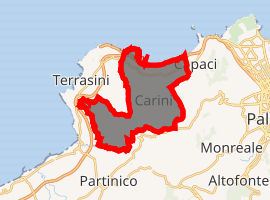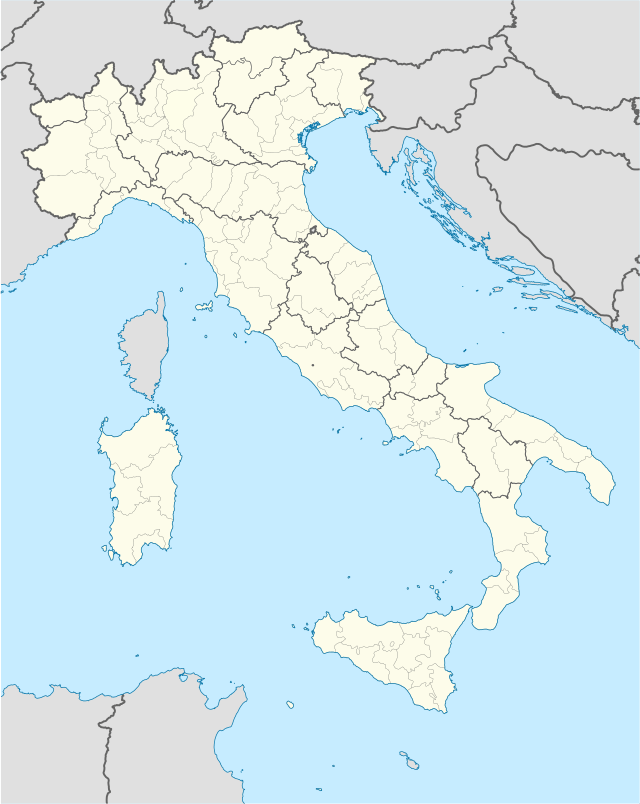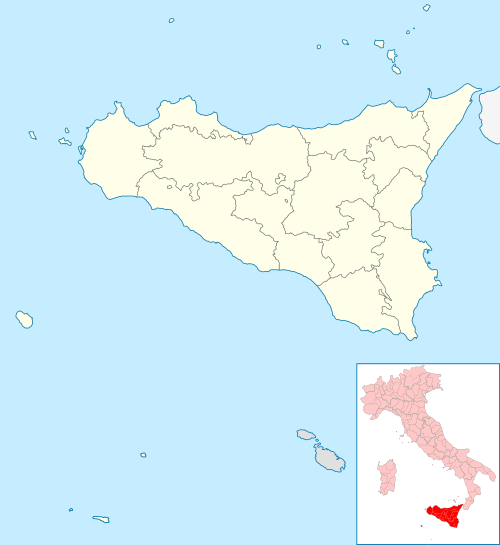Carini
Carini (Latin:Hyccara or Hyccarum) is a town and comune in the Metropolitan City of Palermo, Sicily, 19 kilometres (12 mi) by rail west-northwest of Palermo. It has a population of 37,752.
Carini | |
|---|---|
| Comune di Carini | |
Location of Carini 
| |
 Carini Location of Carini in Italy  Carini Carini (Sicily) | |
| Coordinates: 38°8′N 13°11′E | |
| Country | Italy |
| Region | Sicily |
| Metropolitan city | Palermo (PA) |
| Area | |
| • Total | 76.6 km2 (29.6 sq mi) |
| Population (2011)[2] | |
| • Total | 38,000 |
| Time zone | UTC+1 (CET) |
| • Summer (DST) | UTC+2 (CEST) |
| Website | Official website |
The small town, in the ancient periods called Garinis, was built around the X century by the Arabs, not far from Hyccara, the only Sican settlement (probably a fishing village) on the coast. It was stormed and taken by the Athenians in 415 BC, and the inhabitants, among them the famous courtesan Lais, sold as slaves. At Villagrazia Christian catacombs have been found.[3]
The first historical mention of a bishop of the see is in two letters of Pope Gregory the Great, in the 6th century, one addressed to Bonifacius of Reggio Calabria, the other to Barbarus of Carini. But many signs, including local catacombs, show that a Christian community existed at Carini from the 3rd century. A lead seal bears the name of a Felix, bishop of this see. One of Gregory the Great's letters show that the diocese was incorporated into that of Reggio Calabria in September 595, but by 602 it was again under its own bishop. A Bishop John of the see took part in a synod at Rome in 649. The last testimony to its existence dates from the 8th century, and the Muslim conquest of Sicily, which began in 827, brought it to an end as a residential bishopric.[4] As a result, Carini/Hyccara/Hyccarum is today listed by the Catholic Church as a titular see.[5]
Tourism and retail
Tourism is an important part Carini's economy. Carini's lure for tourists is based mainly on shopping but also on its possession of other ancient and modern attractions. Carini has one of the biggest shopping areas in Sicily called the Zona Industriale where more than ten big shopping centres can be found. The Zona Industriale attracts people from the surrounding areas and beyond, especially during weekends and the summer season. Carini has two shopping malls, including one of sicily's largest, centro commerciale Poseidon. The other shopping mall is called Portobello - Le Gallerie del Risparmio.[6]
Military Architecture
Carini Castle
The building was erected in the late ninth and early twelfth century, certainly on a previous Arab construction, by the first Norman feudal lord Rodolfo Bonello, warrior in the retinue of Count Roger. The excavations carried out during the recent restoration, both in the east and in the north, they have surfaced walls of earlier times to the Norman. The castle has a large courtyard, where there is the residential structure made primarily in two elevations. The ground floor consists of: a room with a cross vault that contains a wall in stone, which originally served as the exterior wall. In this are visible windows and a pointed front door with splays of the old medieval structure; A large hall divided by two pointed arches with the central column; The private chapel where you can admire a beautiful wooden tabernacle of the first decade of '600, with Corinthian columns that mark prospectively space. Outside the chapel, a portal giving access to the bastion, where the remains of a perimeter wall are visible. The second floor, reached by an outside stone staircase Billiemi, architect Matteo Carnalivari, comprises: the ballroom, classic example of fifteenth-century room with coffered wooden ceiling, fireplace adorned with the emblem of La Grua and large windows with leaning seats and from the sleeping area, composed of frescoed rooms, where you can admire a beautiful eighteenth-century decorated door that characterizes the alcove. A small circular staircase leads to the kitchen, while another adjoining rooms on the upper floors. From the west side there is access to an area called "Foresteria." A staircase leads to the castle tower or male. The continuous tower with a wooden gallery from which a mullioned window with the emblem of Abbate can observe the south side of the country. The Abbate family commanded the castle from 1283 to 1397 after Palmerio Abbate campaigned with Geovanni Procida during the War of the Sicilian Vespers. The castle was then commanded by the La Grua Talamanca family. Here is the time to cruise with plumes also ending with Billiemi stone. A scale, which no longer exists, allowing the output to the battlements of the tower. From a door, characterized by an arch lancet, you exit into a small terrace, recently created, which allows to observe the city.
Coastal Defensive Towers
Torre Muzza, built in the seventeenth century and located on the coastal strip in Piraineto area;
Internal Defensive Towers to the Territory Franco tower, built in the seventeenth century and located close to the Villagrazia di Carini; Guardiola Tower, built in the seventeenth century and located near Zucco Fund; Tower of Life, built in the eighteenth century and located near the historic center
Defensive Towers Incorporated into Beams
Tower and trap Baglio, the first of which was built in the thirteenth century and incorporated in the beam in the sixteenth century, located on the coast in places Carborangeli; Tower and beam Chiachea, built in the sixteenth century and located on the coastal strip in locations Chiachea; Tower and beam Milioti, built in the sixteenth century and located near the coast in places Milioti; Tower and beam Aiello, built in the eighteenth century and located near the village of Olives Park; The farm Zucco, complex built in the eighteenth century, surrounded by four towers, famous for its wines.
Main sights
 View of 'Il Castello di Carini'
View of 'Il Castello di Carini' View of the town from 'Il Castello di Carini'
View of the town from 'Il Castello di Carini' View of the 'Piazza Duomo' and 'La Chiesa Madre'
View of the 'Piazza Duomo' and 'La Chiesa Madre'
References
- "Superficie di Comuni Province e Regioni italiane al 9 ottobre 2011". Istat. Retrieved 16 March 2019.
- "Popolazione Residente al 1° Gennaio 2018". Istat. Retrieved 16 March 2019.
- SICILIA. IX. CARINI — Scoperta di catacombe romane., Page: 362, Notizie degli scavi di antichità by Accademia nazionale dei Lincei; Accademia nazionale dei Lincei, Rome. Classe di scienze morali, storiche, critiche e filologiche. Memorie, 1899
- Paolo Bertolini, "Bonifacio" in Dizionario Biografico Treccani
- Annuario Pontificio 2013 (Libreria Editrice Vaticana 2013 ISBN 978-88-209-9070-1), p. 859
- "Archived copy". Archived from the original on 2019-04-25. Retrieved 2019-10-30.CS1 maint: archived copy as title (link)

External links
- The Carini Exchange: Vital Records (Church & Civil) at the Wayback Machine (archived November 1, 2006)